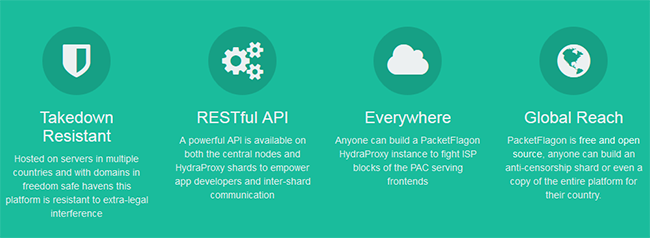Takedown Resistant ‘Hydra Proxy’ Launches to Beat Censorship
samedi 22 août 2015 à 16:59In July 2013 a brand new anti-censorship service burst onto the scene. Aiming to service those who found VPNs too expensive but couldn’t live with the slow speeds provided by Tor, Immunicity provided swift, free access to a wide range of blocked websites.
The service quickly gained an enthusiastic following but just a year later in 2014 it was all over. With support from Hollywood, City of London Police arrested Immunicity’s then 20-year-old operator. A full 12 months later he remains on bail facing an uncertain future.
To mark this anniversary a new service has debuted to finish the job Immunicity started. Titled ‘HydraProxy’, the service isn’t just another run-of-the-mill unblocking tool but one that aims to grow like a hydra.
Hydra Proxy (HP) acts as a frontend to PacketFlagon, a system which in turn is based on the RoutingPacketsisNotaCrime software detailed in our earlier article.
“After the fall of Immunicity it would appear that most people have migrated to using SSH tunnels, Tor or commercial VPN products,” an HP developer informs TF.
“Unfortunately not everyone can afford (or wants) to do that so [Hydra Proxy] will allow those people to continue to evade overzealous filters at libraries, homes, coffee shops, mobile networks and fixed lines at no cost.”
Central to the system is the ability of popular browsers to use Proxy Auto-Config (PAC) files. Browsers are easily configured to use PAC files and in just a couple of minutes users are able to create their own to access any blocked site. Once configured, blocked sites open as usual.
“Essentially the RoutingPacketsIsNotACrime.uk software has been bundled up into a quickly deployable ‘shard’ which talks to a TLS secured common backend API to create, update and view Proxy Auto-Config (PAC) files,” Hydra Proxy’s developer informs TorrentFreak.
One of the main advantages of the project is that since anyone with the know-how can operate their own Hydra Proxy shard, the system becomes more diverse and capable of evading censorship.
“Volunteers can deploy HydraProxy shards which can create and serve PAC files whilst synchronizing with the central node to help frustrate blocks of the PAC serving servers. Or, they can deploy an entire stand-alone platform,” HP’s dev explains.

There are already more than half a dozen Hydra Proxy shards in operation but the project is welcoming more.
“I’d encourage people to register other domains and we will even host them for free – they register a domain for use with PacketFlagon, they contact us and we’ll provide an IP to point the DNS at and then we’ll handle configuring the server and keeping the shard software up-to-date,” the dev says.
The hosting will be provided by Brass Horn Communications, a non-profit entity which not only operates PacketFlagon but also other ISP-esque services such as Tor exits, web hosting and Unix shells. Brass Horn Communications is its own ISP and has “mere-conduit” protection.
Somewhat refreshingly, HP’s developer says he is more than happy to share the fun with others.
“Everything is open-source under a BSD license rather than GPL as it’s more permissive. The goal is undermining censorship not bickering about who owned / misused what,” he explains.
“If someone has the time to take this software and create a commercial model then have at it, if someone wants to create their own independent infrastructure with new branding; please do!”
In conclusion, Hydra Proxy sends the following message.
“Centralization is what allowed the Internet to get in the mess where one DMCA against two companies kills an innocent users uploaded videos or a single court order against four ISPs censors 90% of the population. So take this truly free (as in speech and as in beer) software and help kick the censors’ ass!”
Source: TorrentFreak, for the latest info on copyright, file-sharing, torrent sites and ANONYMOUS VPN services.
 Due to opposing beliefs over how content should be consumed online, there is a war being waged on the Internet, one in which the guerilla forces of the file-sharing masses take on the world’s leading content companies and their armies of lawyers.
Due to opposing beliefs over how content should be consumed online, there is a war being waged on the Internet, one in which the guerilla forces of the file-sharing masses take on the world’s leading content companies and their armies of lawyers. With the option to stream millions of tracks supported by an occasional ad, or free of ads for a small subscription fee, Spotify has proven to be a serious competitor to music piracy.
With the option to stream millions of tracks supported by an occasional ad, or free of ads for a small subscription fee, Spotify has proven to be a serious competitor to music piracy. For most police departments online piracy has no priority, but in recent years City of London Police have made copyright infringement one of their main targets.
For most police departments online piracy has no priority, but in recent years City of London Police have made copyright infringement one of their main targets. According to many of the world’s leading anti-piracy groups, site blocking is one of the most effective tools when it comes to reducing instances of online piracy. It’s a technique employed in a growing list of countries around the world, in Europe in particular.
According to many of the world’s leading anti-piracy groups, site blocking is one of the most effective tools when it comes to reducing instances of online piracy. It’s a technique employed in a growing list of countries around the world, in Europe in particular.